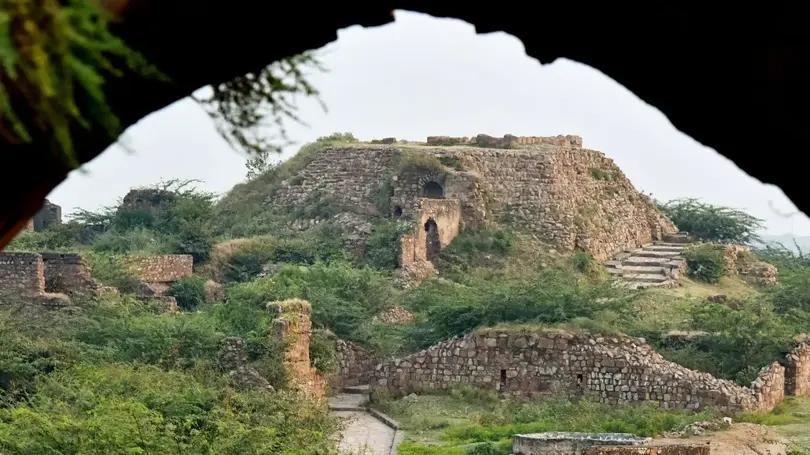
Delhi is a treasure trove of historical sites, the most magnificent among them being its forts. These monuments represent centuries of India's rich heritage and culture, from the Red Fort to Qutub Minar.
But many lesser-known forts in Delhi offer an even deeper insight into the city's past. Here we explore some of these beautiful structures, from the largest fort in Delhi to those tucked away in secluded corners of the city.
Discover how each one tells a unique story about Delhi's history, and marvel at their grandeur as you uncover secrets hidden within their walls.
'Salim Garh' Fort is one of the most important forts in Delhi and a great example of India's rich heritage. Located on an island surrounded by the river Yamuna, it was built in 1546 by Salim Shah Suri, son of Sher Shah Suri.
The fort has seen many rulers over its long history. It served as the prison for Mughal princes before being taken over by British East India Company forces during the 1857 uprising.
Today, visitors can explore this majestic structure and marvel at its grandeur as they uncover secrets hidden within its walls. Its imposing red sandstone walls are flanked by three bastions that offer stunning views of Old Delhi from their ramparts.
Inside, there are two palaces – one belonging to Humayun and another to his son Akbar – along with mosques, gardens, pavilions, and other structures that tell tales about Delhi's past.
Tughlaqabad Fort is a historic fort located in the city of Delhi. It was built by Ghiyas-ud-din Tughlaq, the founder of the Tughlaq Dynasty, in 1321 CE. The fort has an impressive structure and stands as a testament to the grandeur of its builder.
Two massive bastions on either side arched and flanked the entrance gate. Inside is a mosque, palaces, tombs, pavilions, and other structures used for administrative purposes during the reign of Sultanate dynasty rule in India.
Also, Tughlaqabad Fort is an excellent spot for couples looking to spend quality time together amidst history and nature. Its vast open spaces provide a peaceful atmosphere perfect for taking walks, bird-watching, or just enjoying the stunning views of the cityscape from atop its walls.
The Red Fort is the most famous and biggest fort in Old Delhi, India. It was constructed in 1648 by Shah Jahan, the fifth Mughal Emperor. The fort is positioned close to Chandni Chowk.
It stands today as a symbol of power and resilience, having withstood numerous battles throughout its history. The fort has been designated a UNESCO World Heritage Site and is available to visitors from all around the world.
The Red Fort consists of several structures within its massive walls, including two main gates - Lahori Gate and Delhi Gate - along with Diwan-e-Khas (Hall of Private Audience), Diwan–i–Aam (Hall of Public Audience), Mumtaz Mahal (Palace of Beauty) and Rang Mahal (Palace of Colors).
The outer walls are made up of red sandstone, while marble is used extensively inside for decoration. This makes it an important historic site that showcases Indian architecture at its finest.
Purana Qila (Old Fort) is one of Delhi's oldest forts, located in the northern part of the city. Since it was built in the 16th century by Mughal Emperor Humayun, this fort has been an important part of history. It stands as one of the most prominent historical forts in Delhi. It continues to attract visitors from all over India and abroad.
Purana Qila is located on the banks of river Yamuna near Pragati Maidan and was initially built with red sandstone walls that still stand today. The entire fort complex consists of three main gates – Bada Darwaza or Bara Darwaza (the South Gate), Bu Halima's Gate (the West Gate), and Talaqi Gate (the North Gate).
Qila Rai Pithora is an ancient fort in Delhi, India which was originally constructed by the legendary Rajput King Prithviraj Chauhan. Located in the Mehrauli area of South Delhi, the fort was built in the 12th century and served as Prithviraj Chauhan's capital during his reign.
It is said that Prithviraj Chauhan built the fort for protection against foreign invasions as a sign of his tremendous administrative skills. The fort boasts multiple gates, courtyards, and other archaeological remains, which are a constant reminder of its glorious past.
Delhi's forts are a living testament to the city's fascinating history. Whether you explore the famous sites, such as Red Fort and Purana Qila, or discover the lesser-known forts, such as Qila Rai Pithora, you will be captivated by their remarkable architecture and grandeur.
Q1)
Q2)
Q3)